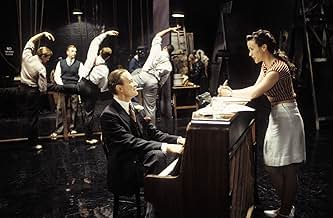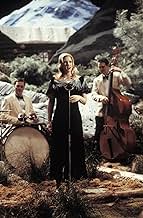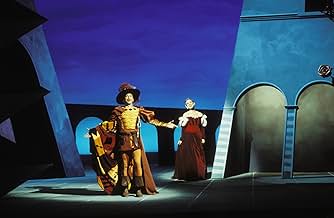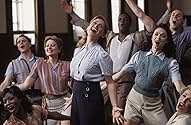Añade un argumento en tu idiomaInspecting a magical biographical stage musical, composer Cole Porter reviews his life and career with his wife, Linda.Inspecting a magical biographical stage musical, composer Cole Porter reviews his life and career with his wife, Linda.Inspecting a magical biographical stage musical, composer Cole Porter reviews his life and career with his wife, Linda.
- Premios
- 2 premios y 13 nominaciones en total
Reseñas destacadas
The introduction of decency codes in Hollywood film-making and the swing in public opinion regarding the gay community had great impact on personal lives at the beginning of the Great Depression. One case in point is the life of William Haines, once the biggest money-maker for specific Hollywood studios, but whose career in film came to a grinding halt when film industry moguls tried to force Haines into a proper, heterosexual "marriage" for social appearances as social conservatism grew in strength as so did the deepening depression. A few years later, "Night and Day", the 1946 film starring Cary Grant, greatly distorted the facts surrounding Cole Porter's life. Post-depression/post-war American society was still not ready for the truth about Cole Porter's life, or homosexuality ("the love that dare not speak its name"), in general. Psychologically, the unrest in Cole Porter's mind regarding his closeted sexuality, his marriage to Linda, his extra-marital dalliances with men and his search for satisfying love have had great impact on the themes in his music. After all, no artist creates within a vacuum; personal experiences influence the creation of art, be it music or otherwise. And, having the greatest understanding of any artist's life, creatively, professionally and personally, allows for the greatest understanding of artistic production.
Although society's understanding and acceptance of gay issues in 2004 would enhance audience favor of this film, regrettably, I left the theater, unfulfilled. This film should have been a snappy cinematic package filled with creative production numbers incorporating Cole Porter's great songs and reflecting upon significant events in his life. Attempts were made. Staging the film as a review of Porter's life viewed scene-by-scene by Cole and his "accomplice" in a darkened theater made for easy understanding of scenes from his adult life. I felt that other, important scenes were missing which would have made for a better understanding of the man. The influences of his privileged childhood in Peru, Indiana, and his college experiences at Yale greatly influenced his direction in life. The easy-to-digest transitions from Paris to various American settings illustrate deft cinematography, staging and editing. However, many scenes looked "too staged" to realistically portray the significant events Cole and his accomplice witness from the main floor of the theatre house. Was this the director's intent? If the staging of the various "scenes" from Porter's life were as Cole remembered them, why were they staged in confining or unrealistic spaces with little bravura and sparkle, considering the man was the essence of these very two things? It's as if every possible cliché was thrown into an impossible to believe setting of Paris when Cole sings to Linda!
The soundtrack to this film is enjoyable. Witnessing the visual performance of present-day artists singing Porter's tunes, however, was hit-or-miss. It was obvious that lip-syncing was taking place. Why cant' such scenes be filmed live, I wonder? Kudos to Robbie Williams' version of "It's De-Lovely" (looking very impish), Alanis Morissette's ""Let's Do It", and Caroline O'Connor's "Anything Goes". Her vocal similarity to Ethel Merman is noteworthy, although the scene did little to display the talents of music and actor. To gain the full impact of these performances, purchase the movie's music compact disc.
If you have an interest in the life of Cole Porter along with his music, I would recommend you see this film to gain some insight. However, if your interest lies only at the level of his music and not of the influences upon his creative output, you will gain small reward by seeing this film, which vacillates in its essence of heart and spirit. Nonetheless, I can recommend the movie's CD.
From the opening scene in the theatre, it just got better as it went along. Kevin Kline's portrayal of Cole Porter was rich and nuanced. He seemed to be truly in love with Linda, yet he still had his other side. Ashley Judd as Linda seemed perfect. When the old Cole Porter sees her again, he says, "My god, she was lovely!" and she was. I identified enough with her and with Kevin Kline that I was saddened by her death in the movie. They sold me on their characters. I ended up feeling empathy for Linda; the lovely, lovable and steadfast; and respect and admiration for the Cole Porter figure.
But, what made the movie fly for me was the music (go figure!). It was Cole Porter, release 1.1. A bunch of his great songs were re-arranged and presented by modern singers - all the way from jazz (Diane Krall) to varieties of pop (Elvis Costello). Each of the singers brought a new feel to the Cole Porter songs and really made the movie a pleasure.
When my wife and I finished the movie on the DVD we spent another hour watching all the special features. We both hated to see the movie end. We just wanted it to go on and on. Like the beat, beat, beat of the tom-tom.........
Serving as a framework for the life events is a curious narration of sorts by an aged Porter and a mysterious host/angel (a nice theatrical turn by Jonathan Pryce). This bracketing narration is reminiscent of A Christmas Carol, and there are striking similarities to the classic All That Jazz in narrative and tone. The main story is told in a series of mini-vignettes; some scenes are almost too brief. Then there are the songs. It is truly phenomenal just how many wonderful Porter songs became standards. The recreations of many of his top hits are interspersed throughout the film and are performed often by top vocalists including some amusing cameos by Elvis Costello, Diana Krall, Alanis Morissette, and Natalie Cole. The songs serve to parallel and punctuate the life events throughout the story in much the same way paintings served as a co-narrative in Frieda.
Although production values are good for a period and location piece, it feels a little less grand in scope than it ought to be. Perhaps that works in the films favor as a more intimate story. Standout credit goes to the makeup effects especially showing the aging of Kevin Kline's character. The camera work and editing are imaginative especially in a series of circular tracking shots which seamlessly meld one timeframe with another. The music is timeless and enjoyable even when sung in pedestrian fashion by Kline. And regarding Kline, he deserves an Oscar nomination for a richly etched portrait of a tortured soul whose search for true love spanned his entire life. Perhaps in the hands of Bob Fosse or Baz Luhrmann, this could have really launched into a wildly imaginative send-off of a musical genius, but director Irwin Winkler (a respected producer turned director like Alan Pakula) has done Cole Porter proud.
I was pleased to see that accomplished singer Kline was able to croak out the songs that his character wrote, because Porter was known to be a poor singer. It would have been a big mistake to have him sing like an angel.
That said, I can only presume that the studio's desire to pander to a young audience is the explanation for an absolutely horrible series of botched attempts by various pop artists to sing Porter's songs. Some, like Elvis Costello's effort, are just able to slide in under the radar, and Natalie Cole's is pretty reasonable. But somebody in charge should have stricken the songs sung by Alannis Morissete ("Let's Do It") and the even worse Sheryl Crowe ("Begin the Beguine"), or at least replaced them with other singers in body or at least in voice. I can see how Morissete's croaky, glitchy vocal stylings work for her in her own pop music, but they only annoy in this context; she also has no sense of the style required. Crowe's voice is actually less irritating in her number, but what were they thinking otherwise? Doesn't she know the melody? Does she only have a range of 5 notes? Instead of attracting younger people to Porter's songs, I expect that it will only make them ask 'why do people like this rubbish', not realizing who is really at fault.
This one would be a DVD keeper for me, if it were not for this glaring problem.
I say 'in song' because barely a moment in not accompanied by Porter's music so recognizable I can cite 'Night and Day,' 'In the Still of the Night,' 'Anything Goes,' 'Let's Misbehave,' and 'True Love' without research help or the least provocation. Kevin Kline plays Porter with 1920's tuxedoed charm embracing the true love of his life, Linda, and the many men who helped him fulfill his need to love everything. Kline's refusal to lip-synch or take singing lessons effectively evokes the voice-challenged Porter and the passionate melancholy of a composer who lived for love.
The difference between this version and the 1946 Cary Grant 'Night and Day' is in the hidden homosexuality of the latter and the overt acceptance in the former. Winkler recreates the moment when Linda acknowledges, accepts, and romanticizes Porter's alternative life. About men she affirms, 'You like them more than I do. Nothing is cruel if it fulfills your promise.' This is fine writing by Jay Cocks ('Age of Innocence') and is her love expressed on a plane only Plato could fully appreciate.
Thus Linda defines a story about love as music, a story attempted in 'Evita' and 'Frida' but never so well expressed as in 'De-Lovely.' Although 'Frida' parallels Frida Kahlo's artful life in her paintings, 'De-Lovely' so arranges Porter's music as to suggest each piece was written for that moment in his life. Judd's portrayal relies on her porcelain beauty, wry smile, and serene wisdom in the service of an unconditional love that cost Linda in embarrassment, extorted money, and time away from Porter.
Songs interpreted by Elvis Costello, Sheryl Crow, and Diana Krall, among others, bring the film into the present with the 'timeless' effect without compromising flawless period depiction of the Jazz Age and Tin Pan Alley. In the end this biopic helped me understand the rewarding and demanding life of Cole Porter, gave me over two hours of glorious song and dance, and made me see again the allure of true love that transcends sex and ego. 'De-Lovely' is 'music from a farther room,' as Eliot's Prufrock would have heard it.
¿Sabías que...?
- CuriosidadesMany scenes in the film are actually one continuous shot. The scene where Cole is visiting the gentleman's club during the song "Love For Sale" is a good example. The scene is supposed to be representing three different times where Cole was in the club. Most of the dancers are costume personnel who would perform costume changes on other actors and themselves and then walk back into the shot. Even the singer changes hair pieces and earrings in this shot.
- PifiasThe scene depicting the song "So In Love" on the opening night of "Kiss Me, Kate" depicts the song as a duet between the two leads during the show's Shakespearean play-within-a-play. In "Kiss Me, Kate," "So In Love" is not a duet. Both of the leads do sing solo versions of the song at a different point in the show, however neither takes place in the play-within-a-play.
- Citas
Monty Woolley: Cole, he's only an actor but he still may be right. He's tried it 7 times already, the song's a problem.
Cole Porter: The song is not a problem, it's a challenge. Jack! Jack my boy, how can I help you? Ask me anything.
Jack: Write another song.
Cole Porter: Oh God, that cuts me right to the quick. I know it's God awful but it's the best I can do and we open in three days.
Jack: Where do you get your ideas?
Cole Porter: I get them all from a little Chinese man in Poughkeepsie.
Jack: Mr Porter, the song goes so high and so low it's impossible.
Cole Porter: It's not impossible. I wrote this with you in mind, I can sing it and I have a range of three notes.
- Créditos adicionalesThe music credits, along with their prime singers, are shown twice, once just before the cast, and then further down where the music credits usually are.
- Banda sonoraIn the Still of the Night
Performed by Kevin Kline and Ashley Judd
Written by Cole Porter
Published by Warner Bros., Inc. / Chappell & Co, Inc. (ASCAP)
Produced by Stephen Endelman and Peter Asher
Selecciones populares
- How long is De-Lovely?Con tecnología de Alexa
Detalles
- Fecha de lanzamiento
- Países de origen
- Sitio oficial
- Idiomas
- Títulos en diferentes países
- De-Lovely
- Localizaciones del rodaje
- Empresas productoras
- Ver más compañías en los créditos en IMDbPro
Taquilla
- Presupuesto
- 15.000.000 US$ (estimación)
- Recaudación en Estados Unidos y Canadá
- 13.456.633 US$
- Fin de semana de estreno en EE. UU. y Canadá
- 292.963 US$
- 4 jul 2004
- Recaudación en todo el mundo
- 18.611.951 US$
- Duración2 horas 5 minutos
- Color
- Mezcla de sonido
- Relación de aspecto
- 2.35 : 1
Contribuir a esta página




































